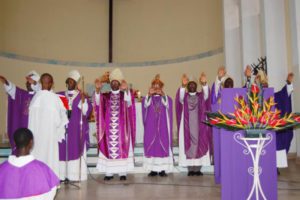The International Federation for Human Rights produced the report in collaboration with six Burundi human rights organisations that the government has banned.

The Catholic Church that had been too critical of human rights violation in Burundi has recently said in a declaration of Bishops that the security situation has improved compared to how it was in 2015.
FIDH report claims President Pierre Nkurunziza and his Cndd-Fdd party’s “obsession to cling on to power at all cost” has pushed the regime into violent “repression” and “dictatorship” against opponents over the last two years.
The report entitled “Burundi on the brink, looking back on two years of terror” accuses Burundi government authorities of seriously violating human rights of political opponents, human rights defenders, journalists and current and former servicemen of Tutsi ethnic background.
According to the report published, after winning a contested re-election in 2015, “President Pierre Nkurunziza has launched a repression campaign against suspected opponents to his regime by deploying security agents loyal to him”.
The report claims the government has given a military training to some Imbonerakure, the youth wing of the ruling party, and used them to implement its authoritarian and repressive policy, terrorize civilians, keep them under close surveillance and spread the party’s ideology.
“In two years, the youth militarization as well as their ideological radicalization and their importance in the regime’s repressive apparatus has increased”.
Over the two years, political opponents have been hunted down, persecuted, assassinated or forced to disappear, says the report.
The report also claims authorities have exploited the political crisis by turning it into an ethnic conflict. Therefore, the government dominated by Hutus accuses Tutsis of seeking to seize power and being responsible for the current crisis.
“Tutsis are constantly the favourite targets of the repression especially those in the Burundi National Defence Forces.”
The report also comes back on the government crackdown on independent media and human rights organisations.
Report that incites ethnic division
Martin Nivyabandi, Minister of Human Rights, Social Affairs and Gender, says the FIDH report dramatizes what’s really happening in Burundi. “Moreover, the report contains claims that incite to ethnic division whereas part of promoting human rights is helping people come together and reconcile”, says Nivyabandi.
“If we consider bad things that occur, they happen to people from all political and ethnic backgrounds”, says Nivyabandi.
“Being in charge of human rights in Burundi, we don’t see any ethnic group that is particularly endangered than others”, he adds.
Mr. Nivyabandi criticizes the report for failing to mention that the security situation has improved.
“Claiming that the situation is getting worse whereas it is improving does not help in promoting human rights”, says Nivyabandi. “Instead, such reports make people live in worry without good reasons.”
He says that the report contradicts the recent report of the Catholic Church saying security has improved.
Willy Namitwe, Senior Advisor to President Nkurunziza, in charge of Media, Information and Communication, criticizes the report for its omission of major security incidents such as grenade attacks. He says some groups of the opposition have claimed responsibility.
“Nowhere does the report covering two years mention grenade attacks”, says Nyamitwe. “Coup plotters claimed responsibility for the attacks, and the FIDH does not talk about it”.
He refers to an interview by one of the generals who took part in the coup attempt that claimed the responsibility for the attacks as part of their fight against president Nkurunziza.
He also says the report ignores an attack in 2015 by rebels coming from Rwanda.
Nyamitwe draws the attention to the fact that the report does not mention the word “genocide” as many times as the 2016 report did. “FIDH mentioned the word “genocide” 72 times in November 2016, but in July [2017] mentions it only twice”, says Nyamitwe.



















 IWACU Open Data
IWACU Open Data

